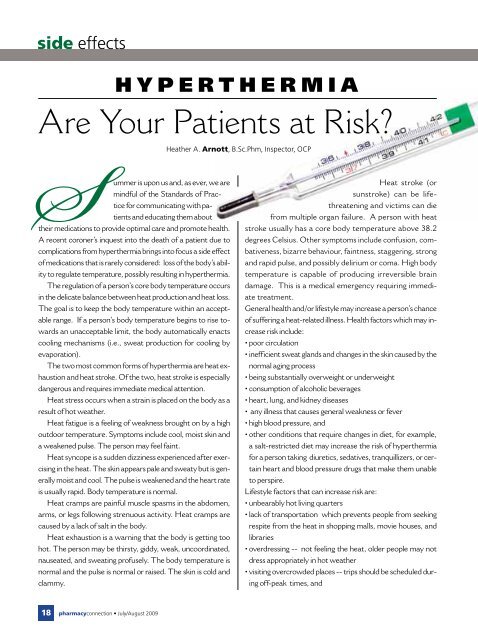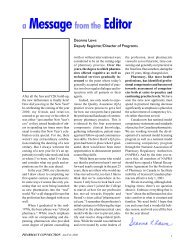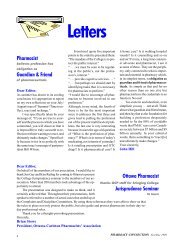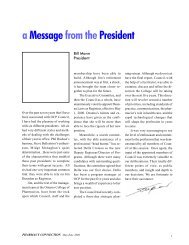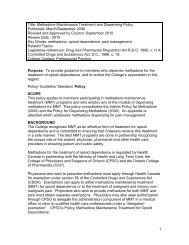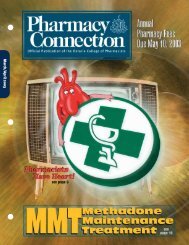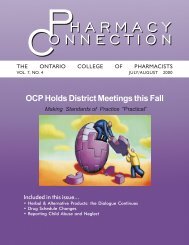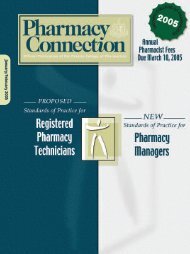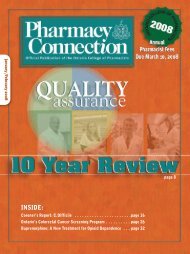Understand the Culture in Which You Practise Hyperthermia: Are ...
Understand the Culture in Which You Practise Hyperthermia: Are ...
Understand the Culture in Which You Practise Hyperthermia: Are ...
You also want an ePaper? Increase the reach of your titles
YUMPU automatically turns print PDFs into web optimized ePapers that Google loves.
side effects<br />
H Y P E R T H E R M I A<br />
<strong>Are</strong> <strong>You</strong>r Patients at Risk?<br />
S<strong>the</strong>ir medications to provide optimal care and promote health.<br />
ummer is upon us and, as ever, we are<br />
m<strong>in</strong>dful of <strong>the</strong> Standards of Practice<br />
for communicat<strong>in</strong>g with patients<br />
and educat<strong>in</strong>g <strong>the</strong>m about<br />
A recent coroner’s <strong>in</strong>quest <strong>in</strong>to <strong>the</strong> death of a patient due to<br />
complications from hyper<strong>the</strong>rmia br<strong>in</strong>gs <strong>in</strong>to focus a side effect<br />
of medications that is rarely considered: loss of <strong>the</strong> body’s ability<br />
to regulate temperature, possibly result<strong>in</strong>g <strong>in</strong> hyper<strong>the</strong>rmia.<br />
The regulation of a person’s core body temperature occurs<br />
<strong>in</strong> <strong>the</strong> delicate balance between heat production and heat loss.<br />
The goal is to keep <strong>the</strong> body temperature with<strong>in</strong> an acceptable<br />
range. If a person’s body temperature beg<strong>in</strong>s to rise towards<br />
an unacceptable limit, <strong>the</strong> body automatically enacts<br />
cool<strong>in</strong>g mechanisms (i.e., sweat production for cool<strong>in</strong>g by<br />
evaporation).<br />
The two most common forms of hyper<strong>the</strong>rmia are heat exhaustion<br />
and heat stroke. Of <strong>the</strong> two, heat stroke is especially<br />
dangerous and requires immediate medical attention.<br />
Heat stress occurs when a stra<strong>in</strong> is placed on <strong>the</strong> body as a<br />
result of hot wea<strong>the</strong>r.<br />
Heat fatigue is a feel<strong>in</strong>g of weakness brought on by a high<br />
outdoor temperature. Symptoms <strong>in</strong>clude cool, moist sk<strong>in</strong> and<br />
a weakened pulse. The person may feel fa<strong>in</strong>t.<br />
Heat syncope is a sudden dizz<strong>in</strong>ess experienced after exercis<strong>in</strong>g<br />
<strong>in</strong> <strong>the</strong> heat. The sk<strong>in</strong> appears pale and sweaty but is generally<br />
moist and cool. The pulse is weakened and <strong>the</strong> heart rate<br />
is usually rapid. Body temperature is normal.<br />
Heat cramps are pa<strong>in</strong>ful muscle spasms <strong>in</strong> <strong>the</strong> abdomen,<br />
arms, or legs follow<strong>in</strong>g strenuous activity. Heat cramps are<br />
caused by a lack of salt <strong>in</strong> <strong>the</strong> body.<br />
Heat exhaustion is a warn<strong>in</strong>g that <strong>the</strong> body is gett<strong>in</strong>g too<br />
hot. The person may be thirsty, giddy, weak, uncoord<strong>in</strong>ated,<br />
nauseated, and sweat<strong>in</strong>g profusely. The body temperature is<br />
normal and <strong>the</strong> pulse is normal or raised. The sk<strong>in</strong> is cold and<br />
clammy.<br />
Hea<strong>the</strong>r A. Arnott, B.Sc.Phm, Inspector, OCP<br />
Heat stroke (or<br />
sunstroke) can be lifethreaten<strong>in</strong>g<br />
and victims can die<br />
from multiple organ failure. A person with heat<br />
stroke usually has a core body temperature above 38.2<br />
degrees Celsius. O<strong>the</strong>r symptoms <strong>in</strong>clude confusion, combativeness,<br />
bizarre behaviour, fa<strong>in</strong>tness, stagger<strong>in</strong>g, strong<br />
and rapid pulse, and possibly delirium or coma. High body<br />
temperature is capable of produc<strong>in</strong>g irreversible bra<strong>in</strong><br />
damage. This is a medical emergency requir<strong>in</strong>g immediate<br />
treatment.<br />
General health and/or lifestyle may <strong>in</strong>crease a person’s chance<br />
of suffer<strong>in</strong>g a heat-related illness. Health factors which may <strong>in</strong>crease<br />
risk <strong>in</strong>clude:<br />
• poor circulation<br />
• <strong>in</strong>efficient sweat glands and changes <strong>in</strong> <strong>the</strong> sk<strong>in</strong> caused by <strong>the</strong><br />
normal ag<strong>in</strong>g process<br />
• be<strong>in</strong>g substantially overweight or underweight<br />
• consumption of alcoholic beverages<br />
• heart, lung, and kidney diseases<br />
• any illness that causes general weakness or fever<br />
• high blood pressure, and<br />
• o<strong>the</strong>r conditions that require changes <strong>in</strong> diet, for example,<br />
a salt-restricted diet may <strong>in</strong>crease <strong>the</strong> risk of hyper<strong>the</strong>rmia<br />
for a person tak<strong>in</strong>g diuretics, sedatives, tranquillizers, or certa<strong>in</strong><br />
heart and blood pressure drugs that make <strong>the</strong>m unable<br />
to perspire.<br />
Lifestyle factors that can <strong>in</strong>crease risk are:<br />
• unbearably hot liv<strong>in</strong>g quarters<br />
• lack of transportation which prevents people from seek<strong>in</strong>g<br />
respite from <strong>the</strong> heat <strong>in</strong> shopp<strong>in</strong>g malls, movie houses, and<br />
libraries<br />
• overdress<strong>in</strong>g -- not feel<strong>in</strong>g <strong>the</strong> heat, older people may not<br />
dress appropriately <strong>in</strong> hot wea<strong>the</strong>r<br />
• visit<strong>in</strong>g overcrowded places -- trips should be scheduled dur<strong>in</strong>g<br />
off-peak times, and<br />
18 pharmacyconnection • July/August 2009


